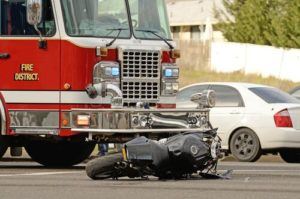Long Island Emergency Vehicle Accident Lawyer
Law Office of Cohen & Jaffe, LLP.
Even when speeding to an emergency, it is the duty of the driver of an emergency services vehicle to show due regard to all other road users. New York’s highest court and the State’s laws governing the operation of emergency vehicles make it clear: Sirens, horns, and flashing lights will never excuse a driver of an emergency vehicle’s reckless behavior.
Operators of emergency vehicles work under the burden of two competing priorities: to arrive at the scene as quickly as possible, but also to arrive safely, without causing an accident. On both ends of the scale, lives hang in the balance: the lives the first responders are racing to save on one side, and the lives of other motorists and pedestrians they encounter en route to the scene.

Who Can Take Legal Action After an Accident With an Emergency Vehicle?
You may have reason to take legal action if:
- An emergency vehicle struck your own vehicle.
- An emergency vehicle struck you as a pedestrian or passenger.
- You were in an emergency vehicle when the driver caused an accident.
If you suffered harm connected in any way to an emergency vehicle accident, allow our firm to help you seek justice.
New York’s Law Governing Emergency Vehicle Drivers
New York law provides qualified immunity from liability for emergency vehicle drivers.
In Ayers v. O’Brien, 13 N.Y.3d 456 (2009), the plaintiff (Ayers) was a Broome County deputy sheriff. While executing a U-turn to pursue a speeding vehicle, his patrol car was struck by the motor vehicle being driven by the defendant. Ayers sued O’Brien for his injuries, alleging negligence. In his defense, O’Brien asserted the defense of comparative fault, and sought to hold the deputy accountable for his own lack of care in operating his cruiser.
Ayers moved to dismiss O’Brien’s affirmative defense, claiming that New York law allowed him a qualified immunity from liability while operating an emergency vehicle. Although the trial court agreed with the plaintiff’s position, the Appellate Division, Third Department did not, ruling that this defense was unavailable to Ayers since he stood in the shoes of a plaintiff, not a defendant.
The Court of Appeals of the State of New York agreed with the Third Department. In doing so, the Court of Appeals first examined the applicable statute. Notably, Section 1104 of the New York State Vehicle and Traffic Law (VTL) affords a number of privileges and protections to operators of authorized emergency vehicles, provided they are involved in an ‘emergency operation’. The statute specifies that the operator of an emergency vehicle may exceed speed limits (as long as such actions do not endanger life or property), run red lights and stop signs, and disregard normal restrictions on turns and directions of movement.
Nonetheless, these privileges are not without limitation, as the Court went on to note. The emergency vehicle operator must always bear the burden of driving with ‘due regard for the safety of all persons’ and will suffer the consequences of driving with ‘reckless disregard for the safety of others’. (See, VTL 1104(e)). Indeed, as Judge Pigott opined, while the law does much to protect an operator from liability in an emergency situation, the statute specifically does not protect the emergency vehicle driver ‘from the consequences of his reckless disregard for the safety of others’. Ayers at 458.
Our Firm Will Help You Recognize the Reckless Behavior of an Emergency Vehicle Operator
There is a fine line between emergency vehicle operators acting with urgency and acting recklessly. Each accident warrants careful examination. Though we can never guarantee that such behaviors quality as reckless acts (again, each case requires careful review), an emergency vehicle operators may be reckless if:
- They ran a red light or stop sign without pausing to see if an intersection was clear.
- They drove at high speeds that caused them to lose control of their vehicle.
- They were changing lanes or weaving in and out of traffic in a way that was likely to cause an accident.
- They were distracted.
- They rear-ended another vehicle.
Other specific circumstances may qualify as reckless operation of an emergency vehicle. Our team will weigh the facts of your case and determine whether a defendant’s actions reach the standard of recklessness.
The Reasoning Behind the Law
The Court of Appeals found the purpose of the law to be clear cut: to give operators of emergency vehicles the freedom to perform their duties unhampered by the standard rules of the road.
The law overcomes the concern that emergency personnel, worried about incurring civil liability, might be deterred from acting decisively and taking calculated risks in order to save life or property or to apprehend lawbreakers. This ‘reckless disregard’ standard, said the Court of Appeals, ‘allows emergency personnel to act swiftly and resolutely while at the same time protecting the public’s safety’.
The ‘recklessness’ standard is a heavy burden of proof to be carried by any party suing an emergency vehicle operator for injuries- it requires proof of something much more than simple negligence on the part of the emergency vehicle operator.
The point to be made, said the Court, is that this statutory protection is a shield, to be employed defensively. It is not a sword to be used offensively, and that meant trouble for Deputy Ayers’ legal position.
The essential difference, said the Court of Appeals, is that Ayers wanted to use the statutory immunity not to defend himself against allegations of negligence, but as a weapon aimed at eradicating O’Brien’s defenses. To allow that would be fundamentally unfair, for if it is the emergency vehicle operator who is the plaintiff then the operator’s conduct could not be held accountable unless it rose to the level of reckless disregard, while the other driver would be denied a defense normally available to him.
Though Emergency Vehicle Cases Have a High Standard of Proof, We Will Seek Justice for You
As you can see, the standard of liability in emergency vehicle accident cases is higher than most other accident types. Our firm is undaunted by this standard of proof. If an emergency vehicle operator or other party acted recklessly, we’ll pursue justice for you.
Our firm will handle your case from start to finish, and will:
- Determine who is liable for your losses: If an emergency vehicle operator puts you in danger through reckless actions, they could be legally responsible for your losses. Their employer, which may be a city, county, or state, may be directly liable for your damages. Our team determines liability in every case that we handle.
- Gather evidence of reckless behavior: We may need to prove that liable parties acted recklessly if we are to meet the burden of proof in your case. Our team will pursue all available evidence of recklessness. Such evidence may include records of communications by the emergency personnel, video footage, witness accounts, expert testimony, and other supporting evidence.
- Calculate the toll of your damages: Our team will identify each of your damages and gain a full understanding of how those damages have impacted your life. We will also assign a monetary value to every damage, including those without an obvious financial cost.
- Handle all insurance-related and legal matters for you: When you trust our firm with your case, you should expect us to handle every detail. We will deal with any insurance-specific aspects of your case. We will handle all paperwork, investigations, communications, and other procedures for you. Your only focus should be on physical, emotional, and cognitive recovery.
Because of the unusually high burden of proof, cases involving emergency vehicles present several unique challenges. The Law Office of Cohen & Jaffe, LLP is familiar with these challenges, and will work tirelessly to overcome them for you.
Qualified Immunity Is Not Complete Immunity
Essentially, an emergency vehicle operator enjoys a qualified immunity, and is subject to losing the shield only when guilty of reckless disregard in the performance of official duties. And while the Court of Appeals strongly reminds us of the special protections awarded to those who put themselves in harm’s way to keep the rest of us safe, it also reminds us that emergency personnel must still exercise due regard for the safety of others on the road.
Emergency responders are public safety personnel who are intimately involved in the maintenance of public health and well-being. This responsibility transcends the patient in the back of an ambulance. It extends to our communities, fellow pedestrians and vehicle operators.
For more information on this topic, contact me directly.
Richard S. Jaffe, ESQ.
Richard Jaffe is a founding attorney partner of the Law Office of Cohen & Jaffe, LLP and volunteers on Long Island, New York as a firefighter and Advanced EMT with Critical Care qualifications, fully classified as and Advanced Life Support (ALS) provider, and trained in techniques such as advanced airway management, IV fluid administration, cardiac monitoring/defibrillation and medication usage/administration in adult and pediatric patients.









